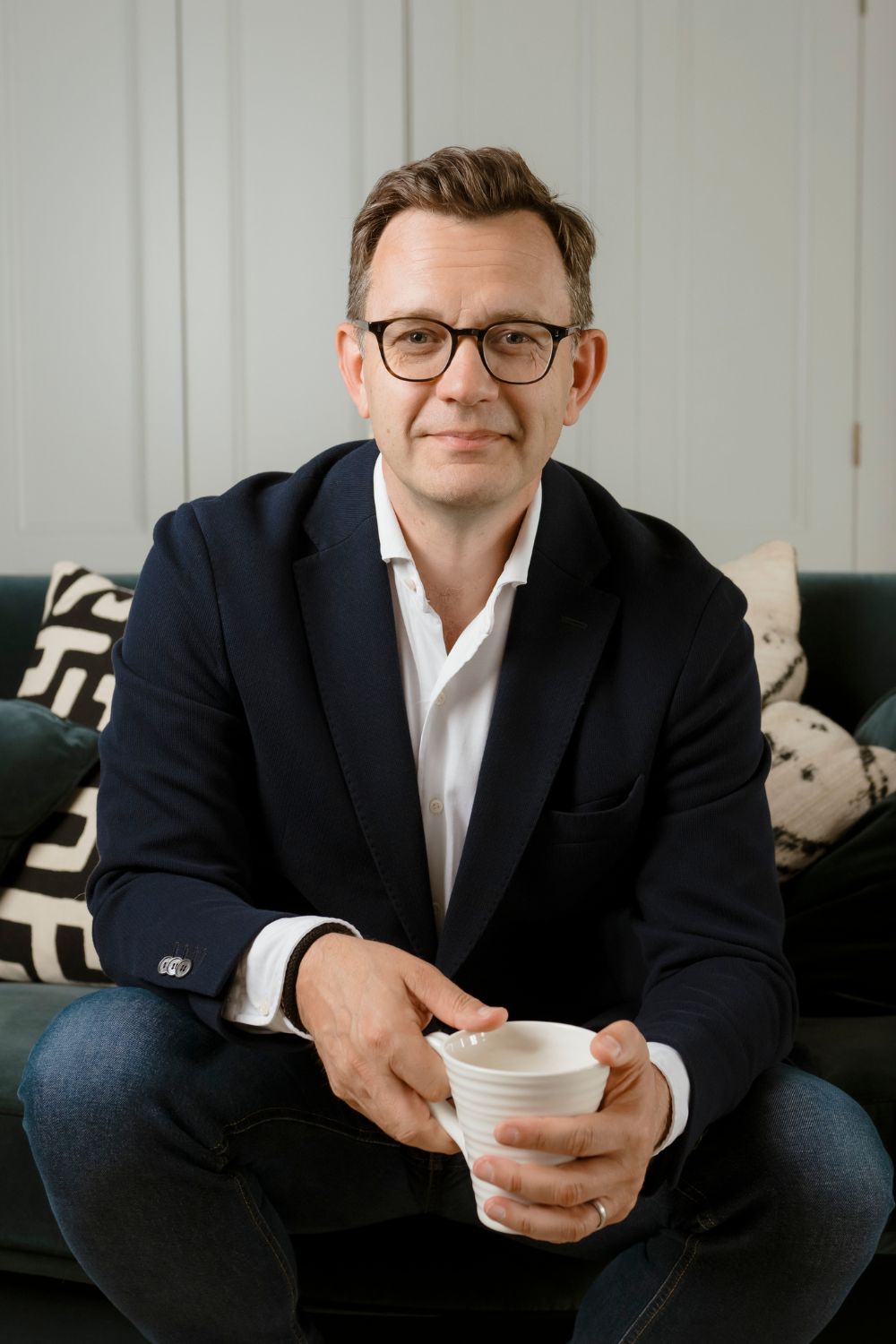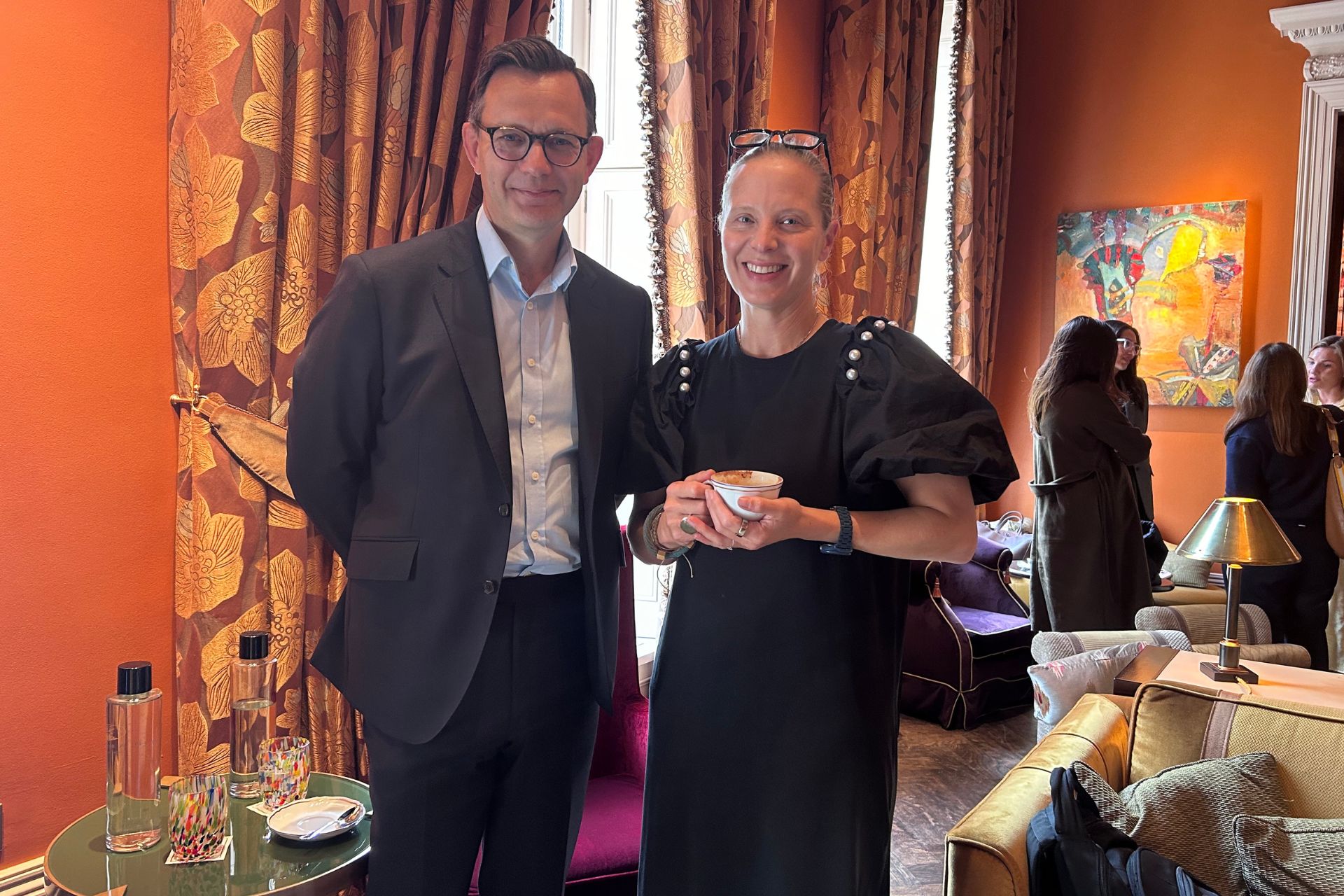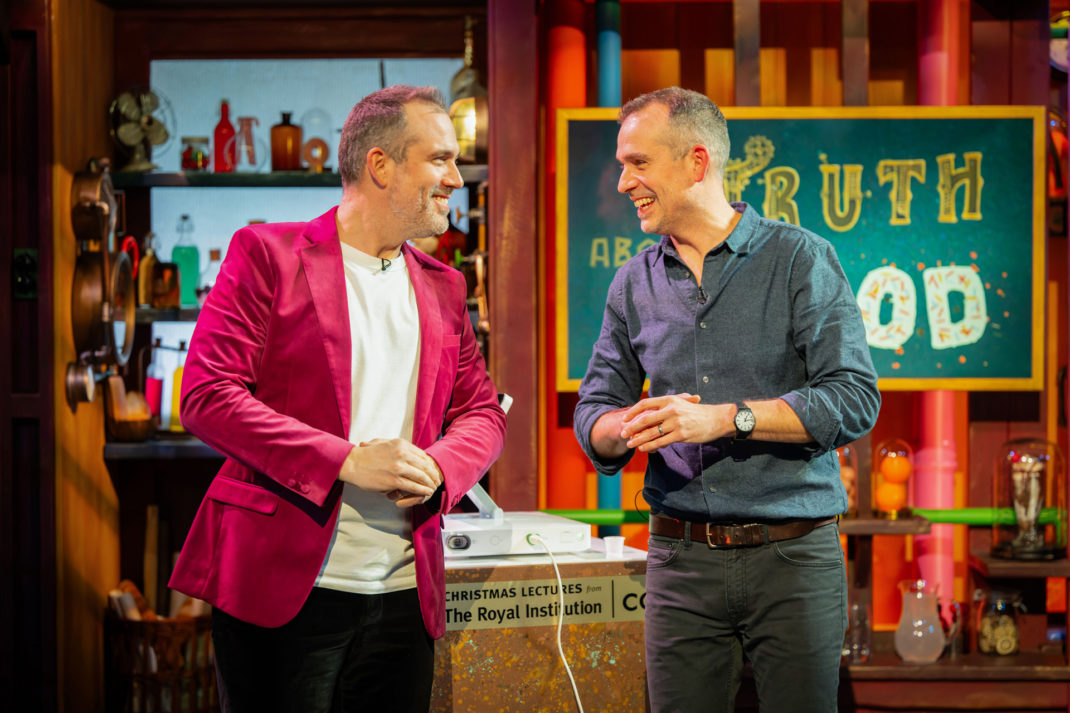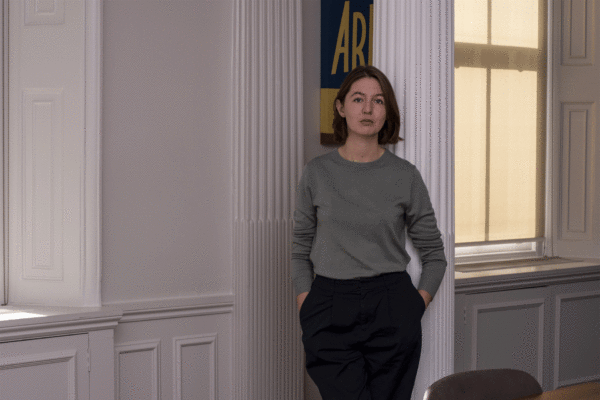
Andy Coulson Talks Prison, Podcasts & What To Do In A Crisis
By
6 months ago
'You've got to grab hold of your failure and move forward with it'
Andy Coulson was, of course, the editor of the News of the World before becoming the Director of Communications for David Cameron’s government. And then the story unfolds as the phone hacking scandal takes hold and Andy ends up being sentenced to 18 months for his involvement. He spent just under five months in Belmarsh and an open prison.
Andy came to talk to Great British Brands members about what he has learned from that experience, and what he can now bring to his communications agency, Coulson Partners, which specialises in crisis management, and his very successful podcast Crisis What Crisis?.
Here, he tells Lucy Cleland why is is so passionate about what you can learn from failure.
Lucy Cleland Interviews Andy Coulson
Lucy: You are the best person to talk about coming through a crisis. Yours was very public facing. What do you wish you’d known before you went through it? And what are your biggest learnings having been through it?
Andy: I found out a lot about myself. I discovered that I’m someone who is flawed in some pretty significant ways, professionally, in terms of what happened at the News of the World.
But I also found out that I’m pretty resilient. I worked out that I’m more than my mistakes. I’ve made mistakes, failed, for sure, professionally, but I’ve also succeeded during my career as well.
It is also an audit on your life when you go through an unravelling, as I did. And I certainly found out who my friends were. And that was an interesting exercise, because although there were a few people who surprised me with their reactions, there were far more people who owed me absolutely nothing, and who ran towards me, ran into the gunfire, and that was a wonderful thing to experience.
And then I discovered that failure can be quite useful. I’m a great believer that there is opportunity in almost every crisis, serious illness aside. There’s normally something that you can dig out and put to work. And that’s my view of failure; if you can confront it, accept it, understand it, analyse it a bit, you can really put it to work. And that’s what I’ve attempted to do.
Lucy: Did you have help?
Andy: The most important help I got was from my wife, who is considerably more evolved than me and who has been nothing short of astonishing. She stood by me and kept the family together with our three sons. They’ve played a very important part as well – with, you know, that lovely mix of love and piss-taking, which is essential in any family.
I also have some professional help. I’ve got a brilliant counsellor up in Scotland who I still talk to from time to time. The key with counselling is you’ve got to find the right person. It’s all about the match with the individual. For me, because I’m a little bit impatient, I went through a few counsellors.
Lucy: When we, as the public, read about someone in crisis, we can be very judgmental, but for someone actually going through that crisis, the emotional toll on that person is huge. How did you cope with it?
Andy: Well, in a funny kind of way, the fact that I used to be one of those people, in a fairly epic fashion, as editor of the News of the World, definitely part of the ‘finger-pointing’ brigade, indeed, it was pretty helpful. There was no room for me to feel sorry for myself. And there was absolutely no room for me to whine or moan. In my view, that would have been grossly hypocritical. And so, in a way, that was helpful, because I’ve nowhere to go with that.
Lucy: But the assault on you as a character?
Andy: Of course, I am a human being, and it was bloody difficult. My reputation was being unravelled. I was cancelled, I suppose is the word that we would use now. I was pretty toxic for about five years, totally unemployable. And you’ve got to deal with the practical impacts of that. I couldn’t earn a living. I’d wander down a street like this, where I used to come into clubs like this and spend my time on a lovely expense account. Then you’re sort of staring through the window, looking in suddenly. I did a lot of walking around town trying to get a business going, trying to get things moving, very much feeling like an outsider, having been very much, I suppose, an insider.
But for me, it was really all about control. It took me about a year to work that out, in truth. I’ve been arrested a number of times, and some of them were expected, some of them were totally unexpected. And one of them that was totally unexpected was when I was arrested by the Scottish police.
It was six o’clock in the morning, I was at home, it’s a glorious sunny day, the kids are in bed and there’s a knock on the door. Suddenly the house is full of policemen. ‘We’re taking you up to Glasgow.’ I rather naively asked what time was the flight. And they said, ‘No, no, back of a van.’
Seven hours later, over the border into Scotland, police outriders next to the van, and then half an hour after that, I’m sat in a cell that was built for terrorists in a government police station on a plastic mattress and shoelaces taken out of my shoes. One-way glass, it was a suicide cell, thoroughly depressing. That was 30 May 2012, so a year into my dramas. And that was the moment when, sat on that mattress, I just thought, ‘my life is absurd. I have totally lost control of my life.’ And that was actually a big turning point for me, because I realised that although I had absolutely no control over what was happening in my life or what would happen next that day, I had total, absolute control of how I would feel about it, and how I would react and what I would what I would do as a result of that. And so I surrendered to it, but there’s a very important distinction: surrendering in those circumstances is not the same as giving up. I hadn’t given up. I just accepted what was happening to me and then started to focus my mind, and what I had control over. And I had control of how I felt, most importantly, and how I would therefore behave in the hours, days, weeks, as it turns out, years that followed. And that was the beginning of getting a bit of a grip, frankly.
I remember it pretty vividly. I was sat there and I just started sort of paying a lot of attention to my breathing. And I thought to myself, you’re breathing in and you’re breathing out. This is a terrible place to be doing, you know, those two things, but one day, you’ll be doing exactly the same two things somewhere wonderful, with your kids around you, with your dog at your feet, and it will be fine, right? Just keep focusing on those two things.
By the way, I’m not looking for a round of applause for it at all. I just think it’s really useful to hear the experiences of people who’ve gone through tough stuff, and the people who I’ve talked to on my podcast have gone through far worse than me.
I made a bag load of failures as editor of the News of the World, properly screwed it up. I always argued that I didn’t break the law, because I don’t believe I did, but I totally got it wrong, and paid a bit of a price for it. But I’ve had people on my podcast, and they’ve been blameless in their crisis, totally blameless. And hearing those stories, I think, is useful.
Lucy: Would you want to be an editor again?
Andy: I’d be a hopeless editor now. I’d be rubbish at it, because, as an editor – and I don’t want to chuck every newspaper editor under the bus here, I can only talk about myself – but there’s something called ‘editoritis’, a condition that you don’t hear a lot about. It’s strangely that the world revolves around you, or whatever it is you’re doing that week. I certainly suffered from editoritis, for sure. And, as an editor, particularly during the time when tabloids were still pretty much in their pomp, I’d spend my time in two places, largely: either in ‘it’s amazing’ or ‘it’s outrageous.’ It’s one of those two things, very rarely was I spending my time in the grey. And the truth is, life’s in the grey. My life certainly is in the grey now, so I’d be rubbish at it now.
Lucy: In the age of social media, if something happens to you or your business, do you have any hope of controlling that narrative once it’s on there? What are your steps to deal with that?
Andy: If you are able to, get to the point where you understand that social media is not real life. When you’re seeing all those negative comments come in, that doesn’t necessarily reflect how the majority of people, or your customer base, will actually feel about it. But you’ve got to get to the truth of your problem in the same way as I had to get to the truth of my problem. You’ve got to ask yourself some questions long before you decide whether or not you’re going to react. And that obviously can have to happen pretty swiftly. That’s what we do at Coulson Partners.
For me, it’s all about helping our clients ask those questions long before they get to whether or not there’s a statement. Because the problem with crisis is that you immediately think, ‘Oh, God, I’ve got to say something. I’ve got to do something. It’s saying something or doing something that’s going to stop this crisis.’ That is often not the case.
The first question that I ask, usually, is, ‘how are you?’ Not just because it’s a nice thing to ask, which it is, but because it’s actually a really strategically important question. If I get an answer that tells me you’re all over the place, then there’s something else that needs to be done long before we start to deal with the crisis. Particularly if it’s a personal issue. But the most important question thereafter is, ‘are you actually in crisis?’ Because the term is overused. That’s very, very important.
Lucy: How do you do that?
Andy: My definition of crisis is if you’ve properly lost control of either your life or the desired direction of your life or of your business. If you’ve properly lost control of that, then you’re in crisis. And then the crisis work can begin. But more often than not, it turns out to be a proper problem. And that doesn’t mean it doesn’t require management and help and support and professional advice, but once you’ve categorised it as a problem, it’s really helpful.

Lucy: Can you give us an example of what has constituted a proper crisis?
Andy: I work with people who have been in very high profile, existential, life-changing problems that have turned their life upside down. I’ve also worked with businesses and business leaders who are using the word crisis in the room and are talking about ‘meltdown’ and ‘firestorms’, using all those words, and actually, within 15 minutes, it’s perfectly clear that that’s not the case. I don’t talk about my clients and the work because my business is all about discretion.
Lucy: For people running their own businesses, what is the minimum they need to have in place, whether a tiny business or a huge corporation?
Andy: It depends on the size of the business. What you’ve got to have is your antenna up as an early warning system. ‘Speed kills’ and all the old cliches are all true when it comes to crisis. So you’ve got to be on your toes, but you can’t let that tip into paranoia.
So, whatever the size of your business, whoever you’ve got in your business – maybe you’re big enough to have others doing it for you outside of the business, which is even better, because it’s more objective – you just have to have your early warning system on, and then you’ve got to have the internal system.
That means that when a flag goes up, you’re able to move swiftly, because those questions that I just described are quite involved. Trying to work out whether you’re in a crisis or a problem is not something you can do in 30 seconds. You’ve got to have the internal processes in place to be able to get to it quickly. And then that often leads to an interesting problem, which, in our work, we’re hoping to try and provide a bit of the solution for.
Having decided whether or not you’re in crisis or it’s a problem, you’ve then got to work out who’s going to help you solve this. Who are you going to have in the room? And politics, where I’ve worked for a while, is full of people who are in the room who shouldn’t be in there. Crisis attracts certain types of personalities, particularly in politics. People bloody love drama. We’re built for it.
When I was in politics, one of my jobs was to decide who’s in and who’s out in the decision making. What you want is people who will take a step forward when they’re running into the gunfire. You don’t want people to just love the drama or those who just sort of disappear into the wallpaper, which would happen to a lot of advisors who just didn’t have opinions that are of use to you.
The other thing, particularly in smaller businesses, is that the temptation when you hit a crisis is to lean towards your friends, which is a perfectly natural thing to do; or you lean towards the people that you’re closest to at work. They may be helpful people, often not right, because they’ve just got slightly distinctive views. You’ve really got to try and find the neutral ‘no skin in the game’ opinion, so that you can judge it clearly for yourself.
You’ve got to be able to step away from your problem, particularly when it’s your business. It’s very emotional. All the triggers start to kind of bubble up, and then that’s when it all starts to go wrong. So: clarity, clarity, clarity.
Lucy: So you’d recommend identifying those people that you want in the room when the shit hits the fan?
Andy: Yes, and don’t make the judgment on the basis of friendship or seniority. It might well be that they are the people. But don’t make the assumption that they have to be the people.
Lucy: What if you’ve got someone who wants to do a full ‘mea culpa’ kind of breast-beating apology? Would you argue against that?
Andy: It depends on the circumstances. Of course, you want to try and get ahead of the story, but it’s getting ahead of a problem so you can get some clarity to then take a breath and actually try and work out what’s the real truth. Resting places in crises are so important, and that can be the primary purpose of the first statement that you put out – to try and suck some air out of it, to reduce the temperature, to find some space to then be able to think more clearly about what is almost certainly a pretty complicated problem.
Lucy: When a business goes through a real crisis and it affects their financials, their reputation, is rehabilitation always possible if you put enough resources, enough money, and enough blockades around it?
Andy: It goes to that failure point again. If you asked me in 2012, ‘is your reputation over forever?’, I might want to say yes. I suspect you wouldn’t have struggled to find other people to say yes, either. But it wasn’t, and I think there’s very little in life that is final reputationally. But I think if you try and reinvent yourself, or more dangerously, push it to one side, rather than leaning into the problem, then you’ll probably fail is my view. You’ve got to grab hold of your failure. Grab hold of whatever problem you’ve got in your business, confront the truth of it, and then move forward with it. Don’t try and pretend to be something else, or someone or someone else.
Lucy: Do you think you’re a huge advocate for failure? A lot of people wouldn’t want to speak about what they’ve been through. But if you hadn’t been through your failure, would you be here today?
Andy: It’s impossible to answer, really, I might have continued to be News of the World editor. My career track was pretty well set. I was set to be the editor of The Sun, because I’d actually done quite a good job at the News of the World – until I didn’t. And I don’t know who I would have become as a result of that. But equally, I think it’s about your upbringing and you as an individual. I’m still the same person. I just lost my way a bit. But it wasn’t all bad. The News of the World is now portrayed as some sort of Death Star sitting around trying to ruin people’s lives. And actually, what I would say – and it’s important, if slightly off subject – but whenever I talk about this stuff, it’s very, very important to me that I apologise as well. I think that is also very important. What went wrong at the News of the World was real. It impacted a lot of people’s lives. And I’m sorry about it. I really am, and always will be, and will always apologise for it, actually, but what I won’t apologise for – and this is the interesting thing about apologies – is for going on with my life. I’m going to put the rest of my life to good use as best I can. I love to be productive. That has always been very important to me and obviously for my family and the people I care about. That’s what it’s all about for me.
Lucy: Are you grateful for your experience?
Andy: I am grateful for my experiences. Yeah, I think it’s been quite interesting.
Lucy: Are you writing a book?
Andy: No, I was going to when I first came out of prison. I was in prison exactly 10 years ago. November 2024 will be exactly 10 years since I came out of prison, but then I went straight into another trial – the Scottish one I mentioned earlier.
Most people who go to prison kind of know where the door is, however far away that door is. I knew where the door was, but I knew that they would take me into another trial with considerably more serious consequences. So I came out of prison, was actually on a tag for a while, then got sent to Scotland, and was on trial again, and then acquitted, which was a good day.
I then started to think, ‘what am I going to do in my life?’ And there were limited options. And one of them was to write a book. But my plan always, actually, was to leave Number 10 and set up a business. So I had that idea in the back of my head, but also I wrote a treatment for a book and then thought, I don’t want to be that person. I don’t want to go around kicking shins, telling my stories. The book obviously would want to tell all my newspaper stories, throw people under the bus, all that rubbish. And I just thought, ‘I don’t want to do that.’ So I concentrated on the business. And that has turned out to be pretty good. And the podcast has been great.
The really, really pleasing thing about a podcast, which has happened quite recently, is that I’ve ended up doing a deal with the Ministry of Justice. And the podcast is now available in prison. So I spent some time sat in a cell, you know, with a sort of battered portable telly, watching Homes under the Hammer. And I just thought thatthere should be more productive content, not entertainment, but there should be something a bit more useful, a bit more positive. And the podcast is now available to prisoners. And I love that. That is a lovely little circle for me.
Lucy: From your own experience of it, how far in crisis is the prison system?
Andy: Yeah, it’s pretty broken. Belmarsh certainly was broken, because it was in between governors, so it was just not being managed. So most of the two months I spent in Belmarsh, for 22 or 23 hours of the day, I just sat in a cell with a couple of other blokes, no one’s idea of fun. And the system has only gotten worse. I had James Timpson, who’s now the prison minister, on the podcast some time ago. It’s worth listening to, because he said the prison population should be reduced by a third. So I think – and I can’t believe I’m sitting here supporting the new government, but there we are – that they’re in the right place.
With James there, I suspect you’re going to see the prison population reduced, and that, for me, is the right thing. There are far too many people in prison.
Lucy: As we close, are there any words of wisdom you would like to share?
Andy: Remember that it will end. Also, that gratitude is a very important word to have in mind. I’ve just recorded a podcast with a woman called Sarah De Lagarde. Sarah is in comms, and she’s working in the city, and she works late. As a result, she can’t get an Uber, jumps on the train, falls asleep on the train, wakes up at the end of the line, and gets out of the tube. It’s been raining, and she realises the tube that she just got off is the one that takes her back home. She turns around and falls down the gap between the platform and the train. She smacks her head, knocks herself out, breaks her nose, and then wakes up as the train leaves the station and takes off her right arm. She is now awake. She’s screaming. She’s obviously in unbelievable pain. Her mobile phone is in the middle of the track. She reaches out with her left hand. The phone doesn’t recognise her face because she’s so battered. And she’s there for 10 minutes.
She’d climbed Kilimanjaro not long before, and during that climb, she’d learned how to slow her breath down, and she realised the importance of it not least to slow the blood flow and stop her bleeding out. And then she saw another tube coming into the station, heading towards her, which is your worst nightmare. And that train took off her right leg. And so she’s now under that train screaming. Fortunately, someone there notices her, and it’s a very long process to get her out from under the tube.
Remarkably she survives, and very recently climbed Kilimanjaro again. What an astonishing woman. She talked a lot about gratitude. But the bit that really struck me, what really moved me was when she was talking about her lost limbs, and she said that having lost them, she said goodbye to them in a very sort of formal way, like a ceremony, and she thanked them for their service. Because it was losing the limbs, actually, in the end, that allowed her to stay alive. I just think that is the most astonishing example of gratitude.
Audience Q&A
Question 1: If Gerald Ratner had come to you at the time he’d said all his jewellery was rubbish, would we have more Signet shops on our high streets?
Andy: I don’t know. It has become a sort of totem for crisis management. I think that one was born out of arrogance more than anything else. I don’t know what I would have said to him at the time. Technology is so different now. It would be interesting to run that as a case study through the prism of social media and see whether he could say something now in the way that media works that could have helped him, because it was actually quite a slow moving car crash. People think the headline ran, or he gave the speech, and then that was it. Actually, it took quite a long time. Maybe you could have got out and said the right thing pretty quickly. It’s also an example – which I think is true of my own story too – that he was doing pretty well at that point, and there’s a truism that you are at your most vulnerable when you’re at your most successful.
Question 2: How much do you recognise the element of self-belief, which is created by sycophants around a person in an elevated position, can impact self-judgment and awareness?
Andy: I don’t think my over-inflation of myself was anyone’s fault other than mine. But the danger in leadership that cults of personality can be created. The one that sticks in my mind is United Airlines. They were airline of the year. The Chief Exec was Chief Exec of the year, flying high, absolutely at the top of his game. And then there’s a passenger who gets dragged off the plane. And it was all caught on video, and someone then obviously walks into his office and says, ‘We’ve got a bit of a problem.’ And his reaction was to blame the passenger. He just turned in a statement, which is a great statement to read, actually, because it’s so self-regarding and so contrary to the reality that was in front of him. Someone had been dragged off a plane, I think, got a bloody face, it was quite visceral, but it took him three statements to realise that. Why that is, I suspect, is his own failure. But I suspect it was also the people around him saying, ‘We’re all amazing and important.’ And that is why I say choose the people around you in crisis really, really carefully.
Question 3: How did you rebuild your career when you came out of prison? How did you engage with people again and reposition yourself?
Andy: It was an interesting challenge. I liken it to having rocks in a rucksack, and when I came out of prison, it was pretty heavy. Building a business was difficult and the doors did not open quickly. I had a tremendous amount of friends and a tremendous amount of help. I had the love and support of my family, which is the single most important thing you need. My basis when I left the house in the morning was solid. But the conversations were difficult because a lot of people wanted to meet me, but just out of curiosity. Or rubbernecking, as you might describe it. But then I landed a great client, a fantastic bloke with an amazing business, and he just said, ‘I’m not doing this out of charity. I think you’re bloody useful. I need you in the room.’ And it grew. And then that just gave me so much confidence. And we did a great job for him. And one success leads to another.
I slowly started to build but the core of it, although it was very difficult, and I know this is to sound a bit arrogant, so I apologise in advance, but I never lost sight of the fact that I am more than my mistakes. I’ve been in some really interesting rooms. I’ve done a lot of very good work, both as a journalist and as an advisor. And although I never failed to remember my failures, I never fail to remember my successes either. I am the same bloke who helped to guide someone into Downing Street, I am the same bloke who ran a newspaper that ran some tremendously successful campaigns. And so I kept sight of my value. And I never once sat in front of someone who I thought could be a client, feeling like a fraud. I don’t feel like a fraud. I feel like I’ve got something useful to offer. In the end, it’s up to them to judge whether I’m right or wrong. But that self-confidence never completely disappeared. It was pretty battered, but it never completely disappeared.
Question 4: You’re being honest about accepting your responsibility for your role as editor. But News of the World, let alone News Corp, are pretty massive businesses. To what extent do you feel you were hung out to dry and made to accept all the blame for what was a huge corporation operation?
Andy: Well, that road takes you to bitterness. We haven’t talked about bitterness, and let’s do that very briefly. If I ask you to remember one thing today, it would be this. ‘Why me’ are the two most useless words you can possibly say. It is a scientific fact that there is nothing more useless in life than a self-appointed victim. I decided to live my life and I think the bitterness bullet is always the one to dodge. I think this is attributed to Nelson Mandela: ‘Resentment is like drinking poison and expecting someone else to die.’ It’s exactly that. And I have had some bitter days, I can tell you, properly bitter days. And every time I’ve had one, I will go backwards by a month every time. And so I just decided, with all of that, it’s not for me. It leads to disaster, in my view.
To find out more about Andy’s business, visit coulsonpartners.com. To listen to his podcast Crisis What Crisis? visit crisiswhatcrisis.com.






